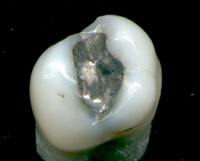Dental Caries
Dental Caries, also known as tooth decay or cavities, is a common medical condition characterised by the destruction of the tooth structure due to acids produced by bacteria. It primarily affects the enamel, dentine, and cementum of the teeth.
Signs and Symptoms
A person experiencing caries may not initially be aware of the disease, as the earliest sign is a chalky white spot on the tooth surface, indicating demineralisation. This can progress to a brown spot and eventually form a cavity if not treated. Symptoms include pain, difficulty eating, and bad breath. Advanced decay can lead to tooth fractures, infection, and abscess formation.

Cause
Tooth decay is caused by the acid produced by bacteria in the biofilm (dental plaque) on the teeth. The primary bacteria involved are Streptococcus mutans and Lactobacillus species. These bacteria metabolise sugars from food, producing acids that demineralise tooth enamel. Factors like a high-sugar diet, poor oral hygiene, and reduced saliva production can increase the risk of caries.

Pathophysiology
The process begins with the formation of a biofilm on the tooth surface. The bacteria in the biofilm produce lactic acid from dietary sugars, leading to demineralisation of enamel. As the decay progresses, it affects the dentine and may eventually reach the pulp, causing pain and potential tooth loss.

Diagnosis
Diagnosis involves visual and tactile inspection using a dental mirror and explorer, often supplemented by radiographs (X-rays) to detect caries in less visible areas. Early caries can be identified by blowing air on the suspect surface, which changes the optical properties of the enamel.
Treatment
Treatment depends on the stage of the lesion. Non-cavitated lesions can be managed with non-operative treatments like fluoride application and improved oral hygiene. Cavitated lesions require operative treatment, which involves removing the decayed tissue and restoring the tooth with materials like amalgam, composite resin, or crowns. In severe cases, root canal therapy or tooth extraction may be necessary.

Prevention
Preventative measures include maintaining good oral hygiene with regular brushing and flossing, a low-sugar diet, and the use of fluoride products. Dental sealants can also be applied to protect the chewing surfaces of molars from decay. Regular dental check-ups are essential for early detection and management of caries.

Epidemiology
Tooth decay is a widespread condition, affecting approximately 3.6 billion people globally. It is most prevalent in developed countries due to higher sugar consumption. The disease is the most common chronic childhood disease in the United States.

Self-assessment MCQs (single best answer)
What is the earliest visible sign of tooth decay?
Which bacteria are primarily responsible for causing tooth decay?
Which of the following is NOT a symptom of advanced tooth decay?
What is the primary cause of tooth decay?
Which diagnostic tool is often used to detect caries in less visible areas?
Which restorative material is seen in the image provided for treatment of cavities?
What is one of the non-operative treatments for non-cavitated lesions?
What is the purpose of dental sealants?
What global population is affected by tooth decay?
Which measure is NOT typically recommended for the prevention of tooth decay?
Dentaljuce
Dentaljuce provides Enhanced Continuing Professional Development (CPD) with GDC-approved Certificates for dental professionals worldwide.
Founded in 2009 by the award-winning Masters team from the School of Dentistry at the University of Birmingham, Dentaljuce has established itself as the leading platform for online CPD.
With over 100 high-quality online courses available for a single annual membership fee, Dentaljuce offers comprehensive e-learning designed for busy dental professionals.
The courses cover a complete range of topics, from clinical skills to patient communication, and are suitable for dentists, nurses, hygienists, therapists, students, and practice managers.
Dentaljuce features Dr. Aiden, a dentally trained AI-powered personal tutor available 24/7 to assist with queries and provide guidance through complex topics, enhancing the learning experience.
Check out our range of courses, or sign up now!


